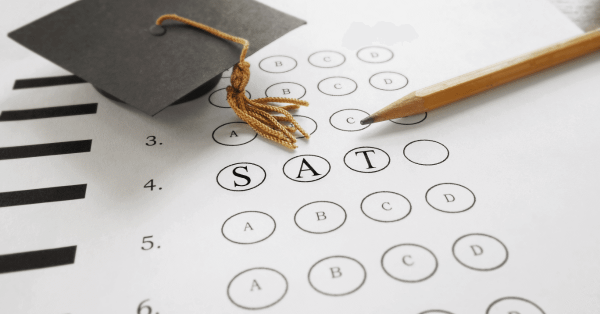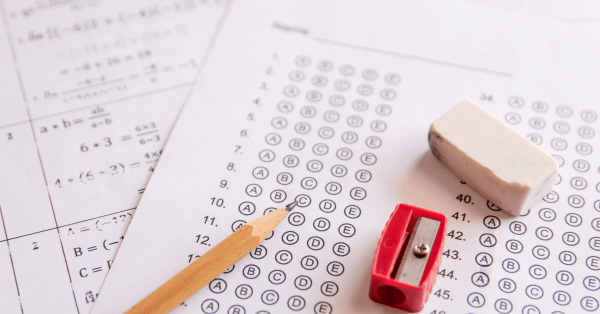Published July 3, 2019

Prepping to take a standardized test might rub some the wrong way, as they equate it with “gaming the system,” and resorting to tricks rather than actually learning the material.
SAT prep expert, Bobby Hood, of Noodle Pros, joined us on a Facebook Live, “How to Prep For the SAT,” and his explanation of why preparation is crucial was not so that a student can circumvent the system, but merely to better understand the test in general.
Here are some of the highlights of our Facebook Live with Bobby:
If the student’s grades don’t match their scores, they need to learn how to take the test in a way so that ultimately, the scores will be commensurate with the grades.
It’s not disingenuous to “play the game,” especially if the student possesses the fundamental knowledge.
There ARE skills that can be gleaned from learning how to take the test.
The process involves learning how to approach problems with efficiency, how to vet answers quickly, and how to analyze situations where you know you’re in over your head and it’s time to move on.
We agree with Bobby that these are invaluable skills to acquire and they will play a large part of the problem-solving one needs to have in college and beyond.
The test represents a bunch of patterns that the student needs to learn.
Here’s this from Bobby:
Take a practice test to get a base score, and decide what you need to do to possibly raise that score in order to get into a college that will be competitive enough for you (and where you will be happy).
As Bobby said, “You shouldn’t start driving until you know where you’re going.”
So, have good idea of where you are “going.”
The Reading Comprehension portion of the SAT is at the beginning of the test and it is 65 minutes long.
This might be a challenge for those students who have a difficult time concentrating on one thing for considerable amounts of time.
The passages are generally written in a style of English that is non-traditional, both language- and subject-wise, so students should be aware of that and not be thrown off.
At the other end of the spectrum, the Math Non-Calculator portion of the test gives you 25 minutes in which to solve 20 questions.
This might be a challenge for students who require more time and for those who are not used to working without a calculator.
How long should one expect to study for the SAT?
It makes sense that those students who will need to brush up on the fundamentals (especially in Math) in order to even be ready to take a practice test will need more time to review.
Those who know the material will merely need to practice taking the test.
Bobby believes that on average, six weeks to two months of intensive work will get most students to the score they’re satisfied with, with three months prep being the maximum amount of time to review.
(Yes, believe it or not, kids will burn out, and say “Enough is enough!”)
Schedule a test for after six weeks of practice and then schedule one for after the first test.
If the first test is acceptable, you can cancel the second test.
If not, work toward upping your score on the second test.
“Everyone needs to start early and have a plan!”
Bobby recommends checking out the “Cracking” series of books from the Princeton Review like this one.
SAT TIP: Purchase the individual books early and use them throughout the semester to help you prepare for the AP tests.
100-200 points is a VERY good increase, that is, 50-100 points on each section.
Private tutors will strive for higher increases, but in cases where that happens, it is remarkable.
The difference between taking a class and a private tutor is the one-on-one attention and the repetition and review of individual problems.
If a student is not getting a problem one way, a private tutor can find other ways in which the student will “get it,” while tutors in large classes will not always have the luxury of addressing every issue.
“Shooting from the hip” no longer works.
Preparation and planning will lead to better results.
Set a goal and aim for that goal.
All students have different strengths, and learn at different paces.
Not everyone will need 25 hours of prep, so don’t get persuaded into purchasing more private or group tutoring than you’ll need.
CONNECT WITH OTHER PARENTS TRYING TO FIGURE OUT HOW TO PAY FOR COLLEGE
JOIN ONE OR ALL OF OUR FACEBOOK GROUPS:

The SAT, or Scholastic Aptitude Test, is a standardized test administered by the College Board. U.S. colleges widely use it...

Table of Contents More than 1.5 million high school students take the Preliminary SAT (PSAT) each year. This guide explains...

One of the questions parents frequently ask is whether students should take the SAT or ACT. I always respond that...
At Road2College you’ll find everything you need to make the admissions and paying for college process less stressful and more transparent.
Explore R2C Insights™ — your source for finding affordable colleges and merit scholarships.
Get coaching on admissions and college financing.
Join Road2College where parents and experts work together to inform and inspire college-bound families.
By Grade:
By Stage in the Process:
Ad Policy Disclaimer: Product name, logo, brands, and other trademarks featured or referred to within Road2College are the property of their respective trademark holders. Information obtained via Road2College™ is for educational purposes only. Please consult a licensed financial professional before making any financial decisions. This site may be compensated through third party advertisers. This site is not endorsed or affiliated with the U.S. Department of Education. By visiting Road2College’s site, you accept and agree to be bound by Road2College’s Terms of Use.